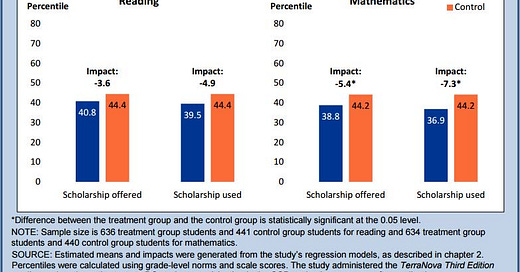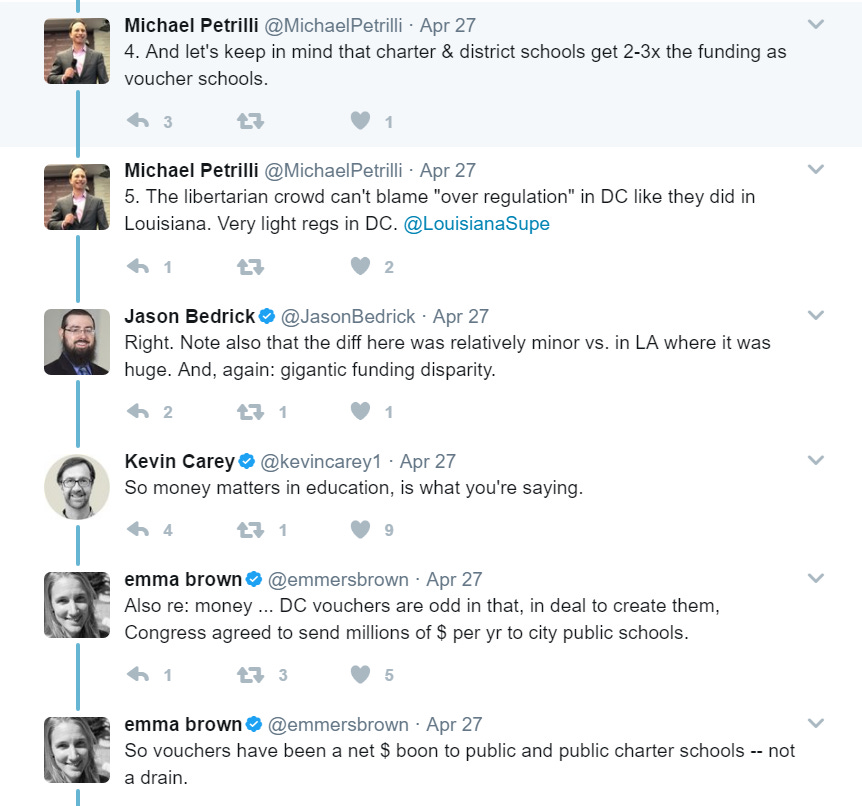why would school choice improve outcomes?
If you are a follower of this blog, you will likely have seen that DC's federally funded voucher program has been an unmitigated disaster, with students within that program performing worse than those in traditional public schools. (Write up; study.) I'm gonna go ahead and say that these results are... not ideal.
People read about these things and ask me - why haven't these programs succeeded? Why is the median charter school - and when it comes to public policy, it's the average that matters - performing no better than the median public school? Why isn't choice working? But perhaps it's time to turn that question around: why would choice lead to better academic outcomes?
That the ability to choose between different schools will lead necessarily to better education - and by better education we of course mean "quantitative metrics such as test scores and graduation rates," in today's world - is so universally believed in policy circles that people rarely feel that the idea needs defending at all. Which is convenient, because the affirmative case for that idea is so incredibly weak.
The culprit, as it is in so many political realms, is Economics 101 thinking, the Yglesiazing of the policy mind. You see, by enabling choice, you create a market for schools, where once there was just the vile hand of government placing students into geographically-appropriate schools. And markets make things better! So in the conventional story, if I'm Johnny Capitalist and I open a widget factory, I have an existential need to offer a value proposition to my customers. I can make a good-enough widget for cheap and offer customers a value proposition. I can make a great widget for more and offer customers a luxury. Or I can offer some combination of the two. One way or the other, though, if I don't make a widget that consumers want to buy, my customers will switch to one of my competitors, I will soon run out of money, and my widget factory will close. That pressure forces me to do a better job, and the consumer wins.
Now, this tidy narrative is in fact bogus even in the world of widget factories - real markets are an unholy mess of monopoly, crony capitalism, fraud, deceit, and marketing - but what's relevant here is that a child's brain is not a widget. The whole simplistic market analogy implies that schools have about the same control over a child's educational outcomes as a business has over the product they create, and this is a plainly ludicrous idea. A school is like a widget factory if, rather than creating and controlling their widgets from the beginning and without exception, factories took widgets into their care four or five years after they were created, if the conditions of that creation and of those four or five years were profoundly unequal, and if the factory handed the widget off to the care of others for 18 out of every 24 hours. A widget factory has ownership over its widgets in a way that schools simply don't have over students. Market forces can only possibly compel people to create a better "product" when those people enjoy substantial control over that product, and the number of variables that dictate academic performance which are not under the the control of schools is massive.
The school choice story persists despite being self-evidently incorrect because to acknowledge the obvious - that schools control a limited portion of the variance in a given student's academic outcomes, and that there are profound limits on the plasticity of those outcomes - would be to violate the Official Dogma.
There are no specific pedagogical mechanisms that are tied to the doctrine of choice. There's no secret book titled "Actually Good Pedagogy" that only charter schools get to buy. There is no experimental approach to learning long division that is only employed in private schools. Your average child moving from one type of school to another might find that their social world has changed, that their commute is easier, or that they like the cafeteria food better. But there is no consistent differences in how charter school teachers teach, no fundamental difference in approach between public and private. When people ask me why the results from some atypical charter success story fail to scale up in places like Detroit or Chicago or Nashville, I often say "because 'charter school' is not a meaningful experimental condition." What, exactly, are we really replicating? Schools in the Mississippi Delta can't replicate Success Academy's endless churn of young striving Ivy Leaguer types who are willing to come and teach for two or three years at low pay and with shitty job security, out of the desire to live in New York no matter what their employment conditions. (And you shouldn't try to replicate their abusive pedagogical practices.) What the designation "charter school" shares broadly is only the ability to fire teachers with impunity, that's all. And that could only possibly work to improve outcomes, again, in a world where teachers control student outcomes in a straightforward and uncomplicated way. They don't.
But the school reform movement cannot fail, it can only be failed, and true to the character of that movement, the DC vouchers fiasco is already being spun.
It should go without saying: this is the kind of excuse making and blame shifting that reform proponents have always inveighed against when it comes from defenders of traditional public education. In a classic case of moving the goalposts, proponents are saying, hey, it was federal money! Hey, it's still early! Hey, the funding just wasn't there! What a remarkable difference from decades of insisting that educational miracles were possible if only we adopted a "no excuses" mentality. I find it all truly cynical. For years, reform advocates have insisted that the magic of markets will improve test scores, and that test scores and test scores alone are the way to judge schools. When their pet programs fail to produce in terms of those very test scores, suddenly, choice proponents discover the value of concerns other than test scores.
Most cynical of all is when, after decades of selling choice as a means, they suddenly celebrate it as an end itself. School choice didn't give us any of the promised gains, but hey - parents can choose! Choice itself is good! This is how bad policy gets justified after the fact. Choice, of course, is the golden calf of neoliberalism, a shibboleth that has been used to justify gutting public programs and destroying public accountability. And choice proponents conveniently forget that these programs result in devastating loss of funding to traditional schools. But once the program is built, and the right people are getting the dollars, and you've already locked people in to the system - well, who cares if the thing actually works? And thus the school reform movement, a decades-long series of massive failures even under its own terms, lumbers on through the halls of power.





